Kingston Home Inspections: What Buyers Need to Know
Buying a home is exciting, but it is also one of the most significant financial decisions you will ever make. A professional home inspection, with its thorough examination of the property, protects your investment by identifying potential problems before you complete your purchase.
In Kingston and surrounding communities, including South Frontenac, Inverary, Napanee, Bath, and Amherstview, inspections carry extra weight. Your active participation in the inspection process is crucial. Rural properties often rely on wells, septic systems, and private roads. Cottages and century homes can hide unique quirks such as stone foundations, aging wiring, or uninsulted attics. Even newer subdivisions such as Cataraqui Woods, Woodhaven, and Collins Bay sometimes reveal surprises behind the walls. An inspection, with your involvement, helps you see past fresh paint and staging, giving you a clear picture of what you are really buying.
📺 Watch: What to Expect from a Home Inspection
_________________________________________________________________________
🧩 What Kingston Home Inspections Cover
A standard inspection typically reviews the home’s major systems and components. Inspectors do not open walls or test appliances, but they will note visible and accessible issues. Here is what they focus on:
-
Roofing and shingles: Missing or curling shingles, poor flashing, and early signs of leaks that can lead to costly repairs.
-
Electrical system and panel: Outdated fuse boxes or aluminum wiring, which were standard in the 1960s–70s builds in Collins Bay and Amherstview, can pose fire hazards or be a red flag for insurance.
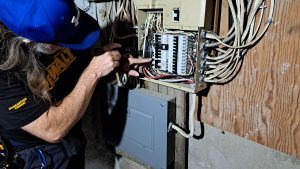
Electrical panel inspection — a key step in identifying outdated wiring and ensuring safety in Kingston-area homes. -
Plumbing and water supply: Inspectors look for leaks, water pressure issues, or outdated piping such as galvanized or Poly-B. In rural areas, they may also recommend well testing.
-
Foundation and structure: Limestone basements are common in both downtown and rural areas. Inspectors watch for step cracks, bowing walls, or water entry.
-
Experts check furnaces, boilers, and AC units for age, efficiency, and service history. Older systems may need upgrades.
-
Attic insulation and ventilation: Poor insulation or blocked vents can cause ice damming, heat loss, and mould.
- Bathroom and kitchen ventilation: Unvented or poorly vented fans can trap moisture, leading to mould growth and indoor air quality problems. Inspectors note whether fans vent properly to the outside.
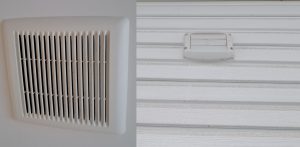
Inspectors check bathroom fans vent properly to the exterior ,not into the attic, to prevent hidden moisture damage in Kingston-area homes -
Windows, doors, and exterior: Drafts, broken seals, and water intrusion points are common in Kingston’s four-season climate.
-
Sump pump operation: If the home has a sump pump, inspectors will usually test it to confirm it works properly, since a failed pump can quickly lead to basement flooding.
-
Safety features: We also review basic items such as smoke detectors, CO detectors, and secure locks to ensure the home meets minimum standards.
- Decks, porches, and stairs: Inspectors check wood condition, attachment to the house, railing strength, and stair stability. Rotten boards, loose fasteners, or missing railings are safety hazards. Many older decks don’t meet current building codes. If inspectors find significant damage, budget for repairs or replacement, and they will probably recommend that a contractor evaluate the situation further.
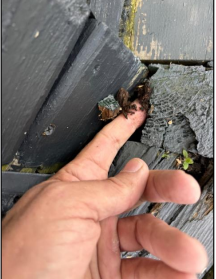
Rot on deck boards is a common safety hazard flagged during inspections in Kingston and surrounding areas
For rural properties, inspectors may also recommend separate well and septic inspections, since those fall outside the scope of a general inspection.
___________________________________________________________________________________________________________________________________________________________________
📝 Buyer’s Checklist: Questions to Ask Your Home Inspector
The value of an inspection is not only the report but also the conversation you have while walking through the home. Here are key questions Kingston buyers should ask:
-
What issues should I address first? This helps you separate urgent repairs from maintenance you can plan for later.
-
Are there any safety hazards that need urgent attention? Electrical wiring, mould, or structural concerns cannot wait.
-
What is the expected lifespan of the roof, furnace, and other major systems? Knowing when replacements are likely helps you budget.
-
Should I arrange additional testing, such as for radon, mould, septic, or well? Kingston’s limestone bedrock and rural settings make these add-ons common.
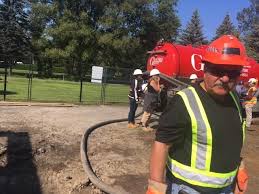
Septic system pump-out by Gribb — a crucial inspection step for rural Kingston and South Frontenac homes -
How can I maintain this system to avoid future problems? Inspectors often share practical maintenance tips.
-
Is this issue typical for a home of this age in Kingston? Century homes downtown differ from 1990s homes in Cataraqui Woods, so context matters.
-
Would you recommend bringing in a specialist? Knowing when to call a plumber, electrician, or HVAC tech prevents surprises.
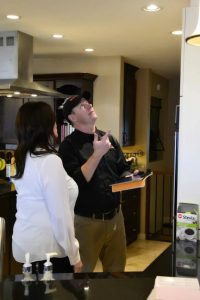
Tip: Bring a notepad or use your phone during the walkthrough so you don’t miss important details.
⚡ Common Problems in Kingston-Area Homes
Every region has its quirks, and Kingston is no exception. Here are some issues inspectors often uncover:
-
Old electrical panels: Knob-and-tube wiring (pre-1950s) in downtown homes, or aluminum branch wiring (1960s–70s) in subdivisions like Collins Bay and Amherstview.
-
Moisture in basements: Older stone foundations are porous and may show efflorescence or seepage.
-
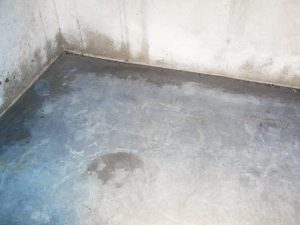
Signs of basement moisture identified during a Kingston home inspection with Century 21 Lanthorn Real Estate Ltd. -
Outdated plumbing: Galvanized steel or Poly-B piping appears in many 1970s–1990s builds across the region.
-
Roof wear or leaks: Freeze-thaw cycles speed up roof aging in Kingston’s climate.
-
Insufficient attic insulation: Common in rural or older homes, causing ice damming on roofs.
- From the late 1970s to the mid-1990s, people widely used Poly-B (polybutylene) piping, once seen as an inexpensive substitute for copper. Over time, however, it has proven prone to unexpected leaks, especially at fittings. While not illegal, Poly-B can make homes harder to insure and may reduce resale value. If it shows up in your inspection, plan for replacement or negotiate a credit to cover future plumbing upgrades.
-
People doing their own home repairs without getting permits: This can happen in neighborhoods with many student rentals around Queen’s, where landlords might look for cheaper options.
- Minor structural concerns: Small cracks in plaster, uneven floors, or slight foundation shifts are common in older homes. While not always major issues, inspectors recommend repairing them early before they worsen.
-
-
Not every problem is a deal breaker, but knowing about them early helps you make informed decisions and negotiate repairs or credits.
- In some cases, if inspectors observe cracks, bowing, or significant movement, they may recommend bringing in a licensed structural engineer. This ensures that a licensed structural engineer properly assesses any foundation concerns and that the home’s long-term stability is not at risk.
___________________________________________________________________________________________________
🚫 Should You Waive the Inspection?
During Kingston’s hottest seller’s markets, some buyers felt pressured to waive inspections.
In today’s more balanced market, that’s rarely advisable.
Skipping an inspection can expose you to expensive surprises, like:
-
Foundation repairs
-
Electrical upgrades
-
Roof replacements
- Outdated plumbing that could fail
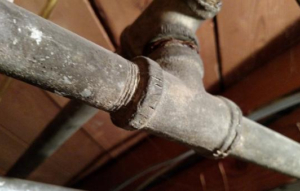
Old galvanized plumbing discovered during a Kingston home inspection with Century 21 Lanthorn Real Estate Ltd.
Instead, talk to your REALTOR® about structuring a conditional offer. This keeps you protected while still presenting a competitive bid.
📺 Watch: 10 Home Inspection Deal Breakers (and how this applies in Kingston & Area)
Why this helps: A quick refresher on costly issues that can derail a deal.
Video:
https://www.youtube.com/watch?v=LCkdEfig0WE
Important points for Ontario buyers
-
Foundation movement: Horizontal or stepped cracks require a structural opinion. In limestone and bedrock pockets around Kingston, drainage and grading are critical.
-
Aging roof: Insurers may hesitate when shingles are at the end of their life. Ask about age, layers, ventilation, and recent leak history.
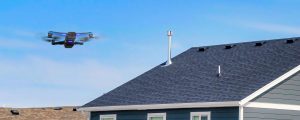
Drone roof inspections provide a safe, thorough view of shingles, flashing, and venting — especially useful for steep or snow-covered Kingston roofs -
Older HVAC: Check service logs and age. When systems are near the end of life, consider negotiating a one-year home warranty credit.
-
Electrical: Outdated panels, mixed wiring, aluminum branch wiring, or over-fusing require a licensed electrician.
-
Sewer laterals: Tree roots and clay tiles are common in older neighbourhoods. A sewer scope can prevent a five-figure surprise.
-
Water and mould: Look for moisture readings in basements and behind finished walls. Fix the source, not the symptoms.
-
Environmental: Vermiculite or other asbestos-containing materials may appear in older homes. Radon testing is advisable in our region.
-
Oil tanks and septic systems : Rural properties may have legacy oil tanks or private septic systems. Removal, remediation, or replacement can be expensive.
What to do next
-
Add the right specialist inspections to your offer conditions.
-
If a major issue appears and the seller will not address it or credit fairly, be prepared to walk away. _______________________________________________________________________________________________________________________________________________________________
After the Inspection: How to Use Your Report
Your inspector will deliver a written report soon after the walkthrough. When it arrives, give it more than a quick skim. Work with your condition deadline in mind, and use these steps to stay organized:
1. Read the full report, not just the summary
Flag anything you do not understand, and pay close attention to items that mention water, electrical, structure, or safety.
2. Sort findings by priority
Create three lists:
-
Health & safety issues: e.g. missing or outdated smoke/CO detectors, reversed outlet polarity, unvented bathrooms, gas leaks.
-
Major systems or water entry: foundation cracks, roof leaks, sump pump concerns, or poor insulation/ventilation.
-
Maintenance or cosmetic items: cracked plaster, minor structural shifts, worn flooring, or loose railings.
3. Call the inspector for clarification
Ask plain-language questions until you are clear on the cause, risk, and urgency. Some inspectors will give ballpark ranges; many will not.
4. Get quotes for significant items
For roof, electrical, plumbing, foundation, HVAC, or moisture concerns, call qualified local contractors for written estimates. For rural homes, add septic, well, and WETT specialists if recommended.
5. Check insurance implications
Older roofs, aluminum branch wiring, or knob-and-tube can affect coverage. Ask your insurer what upgrades they require.
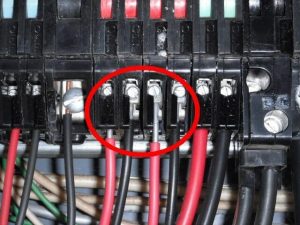
6. Decide your strategy with your REALTOR®
Options typically include:
-
Seller completes repairs by licensed professionals, with receipts and permits provided before closing.
-
Price reduction or credit that reflects verified quotes, so you handle the work after closing.
-
If the issues are severe and the seller will not address them, consider using your inspection contingency to walk away within the agreed timeline.
7. Document everything
Keep the report, quotes, invoices, and any warranties. This helps with future maintenance, insurance, and eventual resale.
💡 Tip: Focus negotiations on health, safety, water entry, and system failure risks. Save minor maintenance items — like cracked plaster or missing weatherstripping — for your post-move to-do list.
_________________________________________________________________________________________________________________________________________________________________
Home Inspection FAQs
Do sellers have to fix problems?
No. Sellers are not obligated to fix problems, but you can discuss repairs or a price change.
Can I attend the inspection?
Yes, and you should. Attending gives you firsthand insight and the chance to ask questions.
How much does it cost?
Typically $400–$600 in Kingston, depending on the home’s size and location. Specialized inspections (well, septic, WETT) are extra.
Is it required in Ontario?
No, but it’s strongly recommended for every buyer.
Kingston Buyer Tip
Electrical risks vary by area. Aluminum branch wiring (mid-1960s–mid-1970s) is most commonly found in Kingston’s west end (e.g., Collins Bay, Auden Park, and Reddendale/Lakeshore) and Amherstview. Knob-and-tube shows up more often in pre-1950s downtown/inner-city homes. Galvanized and Poly-B plumbing appear in many 1970s–1990s builds across the region.
In truly rural properties (South Frontenac, Inverary, Battersea, etc.), the bigger inspection add-ons are usually well and septic, potential oil/propane systems, WETT for wood heat, and environmental items like vermiculite or radon—plus access/maintenance considerations on private roads.
Your REALTOR® can help you decide which extra inspections make sense for the specific property and neighbourhood.
🚫 What Home Inspections Don’t Cover
A standard home inspection is visual and non-invasive. Inspectors focus on what they can see and access, which means several important items fall outside their scope.
Not included in a standard inspection:
-
Opening walls, floors, or ceilings
-
Moving furniture or stored items to see behind or under them
-
Assessing cosmetic issues such as paint, flooring wear, or décor
-
Testing household appliances
-
Inspecting septic systems, wells, pools, or hot tubs
-
Confirming property boundaries or survey details
-
Pest inspections: Inspectors may notice signs of rodents, termites, or carpenter ants, but a separate pest professional should confirm infestation and recommend treatment.
-
Lawn sprinkler and irrigation systems: These are not typically tested. If a home has underground sprinklers or irrigation, consider calling a specialist.
-
Seasonal limitations: If the roof or driveway are covered in snow, the inspector cannot assess condition. Snow can also block access to crawl spaces, decks, or exterior grading.
💡 Tip: If any of these apply to your property, your REALTOR® can help arrange separate inspections or specialist evaluations before firming up your purchase.
⚙️When to Call in Specialists
Depending on what the inspector finds or the type of property, you may also need to bring in additional specialists:
Well Inspection & Water Testing:
For homes with private wells, testing the water supply is not just a precaution, it’s a necessity. A specialist will check for flow rate, pump function, and perform lab tests for bacteria and minerals. Without proper testing, you may inherit water quality issues that affect both your health and daily use. Ensuring the safety and quality of your water is a crucial step in securing your well-being and peace of mind.
Septic System Inspection:
If the property has a septic system, arrange for it to be pumped and inspected before closing. A septic specialist can confirm the tank’s condition, check for leaks or cracks, and assess whether the drainage bed is functioning correctly. Catching problems early can save tens of thousands in replacement costs, providing you with financial security and peace of mind.
WETT Inspection:
Wood stoves and fireplaces require a WETT (Wood Energy Technology Transfer) inspection for insurance. The inspector ensures that the installation meets safety codes and identifies risks such as creosote buildup, poor venting, or clearance issues. These systems can be excellent for heating, but they need to be safe and insurable. Understanding the necessity of a WETT inspection will make you feel prepared and informed about your property’s safety measures.
HVAC or Electrical Specialist:
When an inspector flags concerns with heating, cooling, or electrical systems, it’s best to call in a licensed technician. They can test furnace efficiency, confirm electrical panels are up to code, and look for unsafe wiring or outdated equipment. These systems are expensive to repair, so specialist input can influence negotiations.
Electrical Outlet Polarity and Grounding
During an inspection, your inspector may test outlets to confirm correct polarity and grounding. Incorrect polarity or missing grounds are common in older homes, and while often easy to fix, a licensed electrician should address them to prevent fire or shock hazards.
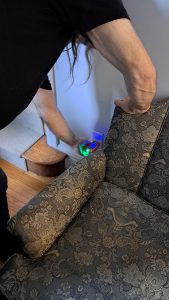
Radon or Mould Testing:
Homes that are older or at lower elevations might experience radon gas entry or hidden mould.Both can pose serious health risks. An environmental tester with proper qualifications can assess radon levels or collect samples for mould.Addressing these issues early protects both health and home value.
Asbestos or Vermiculite Testing:
In some older Kingston properties, insulation or building materials may contain asbestos or vermiculite. If disturbed during renovations, they can release harmful fibres into the air. A certified abatement specialist can test samples safely and guide removal or containment.
Plumbing Specialist:
If your inspector identifies issues such as S-traps, slow or leaking drains, missing plumbing vents (no air behind the water), or any persistent leaks, it’s time to bring in a licensed plumber. These may seem like minor concerns, but they can lead to sewer gas odours, water damage, or even mould if left unaddressed. More importantly, they could escalate into bigger, more costly problems. AA professional plumber can bring the system up to code and prevent these potential disasters.
Environmental Hazards
If your inspector identifies visible mould, suspicious insulation, or air quality issues, call in an environmental consultant. They can conduct lab testing for mould spores, asbestos, or other airborne hazards. Crawl spaces and attics in older Kingston, Lennox & Addington, and Leeds & the Thousand Islands homes are common problem areas. Catching these issues early protects your health, ensures the home is safe, and avoids major remediation costs later.
Structural Engineer
If your inspector finds major foundation cracks, bowing walls, or evidence of structural shifting, they may advise bringing in a structural engineer. Unlike a general contractor, a structural engineer can provide stamped reports, which are often required for serious repair plans or when negotiating with sellers. This is especially relevant to older limestone basements or properties with drainage challenges in Kingston, Frontenac, Lennox & Addington, and Leeds & the Thousand Islands.
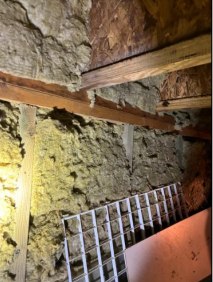
________________________________________________________________________________________________________________________
Need Local Experts?
When inspection issues come up, you do not have to navigate them alone. I work with trusted local home inspectors and specialists across Kingston and the surrounding area. Whether it is a downtown limestone, a Collins Bay family home, or a South Frontenac cottage, I can connect you with the right professionals so you have the full picture before making your decision.
💭 Final Thought
Whether you’re buying a downtown Kingston limestone, a Bayridge family home, or a South Frontenac cottage, a home inspection is one of the smartest investments you can make.
It helps you understand the property, plan for the future, and move forward with confidence.
___________________________________________________________________________________________________________________________________________________________________
Don’t Miss These Guides:
• Protect Your Home: Seasonal Maintenance Tips That Pay Off
Regular maintenance protects your investment and prevents small issues from becoming costly repairs. This guide outlines practical seasonal tasks for homeowners in Kingston and Eastern Ontario, helping you stay ahead of wear, weather, and long-term deterioration.
• Smart Home Upgrades That Boost Resale Value
Not all renovations deliver the same return. This guide reviews practical upgrades that improve function, efficiency, and market appeal, along with which improvements tend to add measurable resale value in the Kingston market.
• Hidden Costs of Buying a Home in Eastern Ontario
The purchase price is only part of the equation. Learn about land transfer tax, inspections, legal fees, insurance, adjustments, and early maintenance expenses so you can budget accurately and avoid financial surprises after closing.



